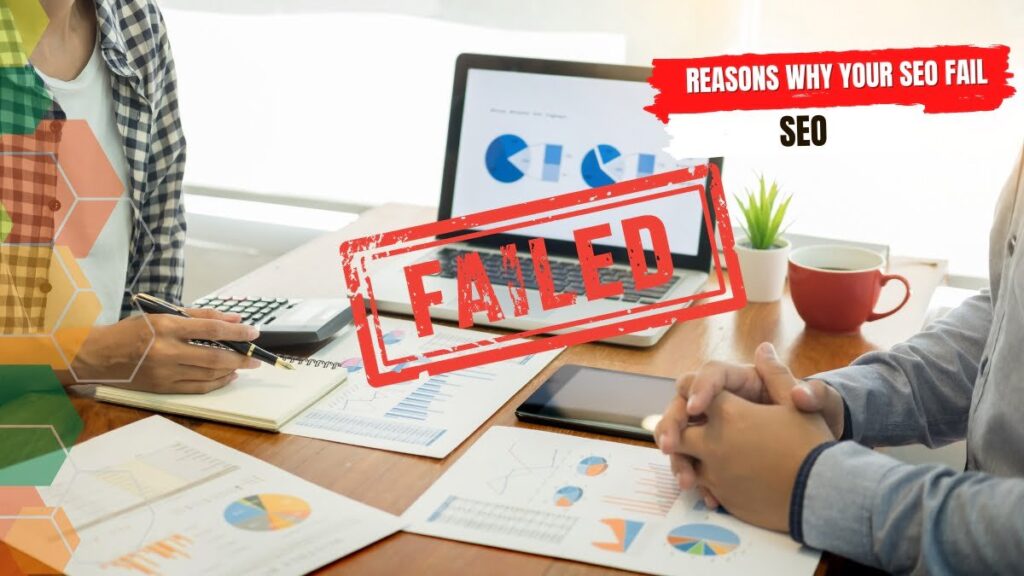You\\\’ve dotted the i\\\’s and crossed the t\\\’s on your SEO checklist, but somehow, your site still lingers in the shadows of Google\\\’s search results. Frustrating? Absolutely. It’s like you’re shouting into a digital void while others grab that coveted spotlight.
It turns out; there might be more to this puzzle than meets the eye – it’s not just about sprinkling keywords and hoping for the best.
Here\\\’s an eyebrow-raiser: recent studies reveal up to 90% of online content gets zero traffic from Google! That means millions of web pages are gathering dust instead of clicks. But don\\\’t hang that \\\’Closed\\\’ sign on your website just yet—this article aims to turn things around by shining a light on common SEO slip-ups and showing you how to fix them.
Get ready, because we\\\’re diving deep into reasons why your SEO might be flunking – without leaving you high and dry. Keep reading; answers await!
Outdated Tactics
When it comes to SEO, resting on your laurels with tactics from yesteryear is the digital equivalent of trying to win a Formula 1 race in a Model T Ford. The search landscape evolves at breakneck speed, and clinging to outdated methods won\\\’t just hold you back—it\\\’ll throw you off the track entirely.
Lack of updating SEO practices
SEO practices need refreshes often. Search engines like Google keep changing the rules. If you don\\\’t keep up, your website might fall behind. Think of SEO as a game where the rules change without notice.
You have to adapt quickly or lose to competitors.
Many businesses set their SEO and forget it. That\\\’s a mistake! The online world moves fast, and what worked last year might not work today. Check your tactics often, learn about new trends, and apply fresh strategies.
Stay ahead in the SEO game by updating regularly; it helps you stay visible to customers searching for what you offer.
Ignoring new algorithms and updates
Search engines constantly change how they rank websites. If you ignore these changes, your site may fall behind. It\\\’s like playing a game without knowing the rules have changed – you can\\\’t win.
Make sure to keep an eye on algorithm updates and adjust your strategies.
Staying stuck with old methods doesn\\\’t work anymore. For your SEO efforts to succeed, evolve with the internet! Learn about the latest updates and use them to improve your website.
This will help ensure that search engines notice and favor your content over others who don’t adapt as quickly.
Your website has poor content
Your website\\\’s content might be falling short, and that\\\’s a major red flag in the realm of SEO. It’s not just about having words on a page anymore; it’s about delivering value that keeps users coming back for more.
Over optimize keywords
Stuffing your website pages with too many keywords can backfire. Search engines like Google are smart and can tell when a site is overdoing it. They might think you\\\’re trying to trick them and push your page down in the rankings.
Keep it natural; use relevant keywords where they fit best.
Filling every sentence with targeted words doesn\\\’t help readers either. It makes content hard to read and enjoy. Instead, focus on writing for humans first, search engines second. That way, people stay longer on your page because they like what they see—and that\\\’s good for SEO success!
No blog and not updating content
Fresh content keeps your website alive. Search engines love new articles, updates, and information. If you don\\\’t have a blog, you\\\’re missing out on a chance to show up in search results more often.
Blogs give you opportunities to use more keywords and provide value to readers. They also invite people back to your site for the latest news or tips.
Updating existing content is just as important as posting new articles. This tells search engines that your website is active and relevant. Make sure old posts still have accurate information and fresh links.
Change things up if certain pages aren\\\’t attracting visitors or if SEO trends shift.
Now let\\\’s talk about setting realistic expectations..
Unrealistic Expectations
4. Unrealistic Expectations: It\\\’s a classic tale of digital woe – business owners donning the SEO cap only to find themselves disillusioned when instant success isn\\\’t delivered on a silver platter.
In the realm of search engine optimization, patience isn’t just a virtue—it\\\’s an essential ingredient for triumph.
Giving up Too Soon
Many business owners throw in the towel before their SEO strategy has a chance to show results. It\\\’s easy to get discouraged when you don\\\’t see immediate progress on search engine rankings.
However, SEO is a long game. Real success takes time and persistence. If you give up too soon, you\\\’ll miss out on potential growth that could come from sticking with it.
Patience is key in building an effective SEO campaign. You need to keep updating your tactics and tweaking your website to stay ahead of the curve. Keep an eye on the prize and remember: good things often take time—especially in SEO where changes can be slow-moving but ultimately rewarding.
Lack of Investment
SEO isn\\\’t just a one-and-done deal. It needs money and time to work well. Think of it like a garden that must be watered and nurtured regularly. If you don\\\’t invest enough, your SEO efforts may fail to grow.
Sure, being cautious with spending is wise, but too little investment means you\\\’re missing out on quality content creation, proper keyword research, or using tools that keep track of how well your site\\\’s doing.
Your competition will likely put in more cash into their SEO strategies. This helps them stay ahead in the game with updated content and better online visibility. To compete effectively, balance your budget so that sufficient funds go towards improving and maintaining your SEO tactics over time.
Remember, investing in SEO is not an expense; it’s an essential part of building a successful online presence for your business.
Poor User Experience
5. Poor User Experience—A website should be a welcoming doorway to your business, but if users find themselves lost in a labyrinth of slow-loading pages and cryptic navigation, they\\\’re likely to leave without looking back..
Which means search engines are taking notes, and not the kind you\\\’d want pinned on your report card.
Slow loading times
Nobody likes to wait, especially online. If your site takes too long to load, people simply leave. Slow loading times kill user interest and tank your search engine rankings. Google rewards fast-loading websites because they provide a better experience for visitors.
If your pages lag, your SEO efforts take a hit.
Speed matters more than ever in this digital age. Users expect quick access to information and services. Make sure your website isn\\\’t weighed down by large images or cluttered code that can slow things down.
Keep it lean, mean, and fast to stay on top of the game – your customers and search engines will thank you for it!
Unresponsive website design
A site that doesn\\\’t adjust to different screens pushes users away. Imagine someone trying to view your products on a phone, and they can\\\’t because the site won\\\’t fit their screen. They\\\’ll leave, frustrated, and possibly never return.
A responsive design means your website looks good and works well on desktops, tablets, and phones.
Your customers are on the move; so should be your website. If it\\\’s not easy to navigate or read on all devices, potential clients will bounce off to competitors with smoother websites.
Next up is how ignoring proper tracking can hurt your SEO efforts even further.
Lack of Analytics and Goal Tracking
Diving headfirst into the digital marketing arena without a map is a surefire way to get lost in the shuffle — that\\\’s precisely what happens when analytics and goal tracking are neglected.
Businesses often miss the mark, not realizing that numbers and patterns are like breadcrumbs leading to online success; understanding your website\\\’s performance through data isn\\\’t just important, it’s critical for steering your SEO strategy in the right direction.
Not understanding performance
Business owners often miss the mark because they don\\\’t track their SEO results. Without knowing how your website performs, it\\\’s like shooting in the dark. You need numbers to show what\\\’s working and what isn\\\’t.
Imagine trying to lose weight without ever stepping on a scale—that\\\’s running SEO campaigns without analytics. It just doesn\\\’t make sense.
You must check your website data regularly. This includes checking how many visitors you get, where they come from, and what they do on your site. If these numbers are low or dropping, something might be off with your SEO strategy.
Only by understanding these figures can you tweak and improve your methods for better results over time.
Unable to make data-driven decisions
SEO strategies can fall flat without concrete data to guide them. Many business owners overlook the power of analytics, leading to shots in the dark rather than informed choices. Without tracking your website\\\’s performance, you miss out on crucial insights.
These insights show what\\\’s working and what isn\\\’t. They also help fine-tune your SEO efforts.
Making decisions backed by data is vital for a successful SEO strategy. If you\\\’re not measuring progress or understanding user behavior, you risk wasting time and money on ineffective tactics.
Tools like Google Analytics give clear views of traffic patterns and engagement levels. Yet, many fail to use them to their full potential or interpret the findings correctly—leaving significant opportunities on the table for improving online visibility and growth.
Targeting Competitive Keywords
Targeting Competitive Keywords:
Diving headfirst into the SEO deep end, some businesses set their sights on highly competitive keywords, only to find themselves struggling to stay afloat in search rankings. Without considering the underutilized potential of long-tail keywords, they miss out on a sea of opportunities that could drive targeted traffic their way.
Difficulty ranking for highly competitive terms
Trying to rank for highly competitive terms can be like trying to win a marathon with no training. These popular keywords are often the battlegrounds for big businesses with large SEO budgets.
They pour resources into staying at the top of search results. Small businesses might feel like David going up against Goliath when they try to compete using these same terms.
A smarter move is focusing on long-tail keywords – longer and more specific phrases that shoppers might use when they\\\’re closer to making a purchase decision. These keywords have less competition and can attract more qualified traffic.
Think about targeting \\\”organic hand-woven cotton scarves\\\” instead of just \\\”scarves.\\\” You\\\’ll likely see better results, gain traction faster, and help your business stand out where it counts.
Not considering long-tail keywords
Moving from the challenge of competitive keywords, there\\\’s another puzzle piece often missed: long-tail keywords. These are longer and more specific phrases that shoppers might type into a search engine.
For example, instead of just \\\”shoes,\\\” someone may search for \\\”women\\\’s waterproof hiking boots.\\\” Long-tail keywords have less competition and can attract more qualified traffic. Businesses not using them might miss out on a key strategy to connect with their ideal customer.
Adding long-tail keywords to your SEO plan is like finding hidden paths in a crowded market. They lead interested buyers straight to your products or services because they match specific searches.
This focused approach means that the visitors coming to your site are likely looking exactly for what you offer, increasing the chances they\\\’ll stick around or make a purchase.
Your website isn’t mobile-first
8. Your website isn’t mobile-first: In the digital tapestry of 2024, a non-mobile-optimized website is akin to a shop with its shutters half-closed; sure, you can peek inside, but the experience leaves much to be desired.
With Google\\\’s mobile-first indexing firmly in place, not prioritizing mobile SEO could be the silent saboteur derailing your ranking ambitions.
Not mobile SEO friendly
Your site might look great on a desktop, but what about on a phone or tablet? More people use their phones to search the web now. If your site doesn\\\’t work well on mobile devices, you\\\’re missing out.
Google ranks mobile-friendly sites higher. Make sure your website adjusts to fit any screen size. Check how it looks and works on different gadgets.
Clicking should be easy, and text must be readable without zooming in. Don’t let pop-ups cover your content on phones; they annoy users and can hurt your ranking. Use tools to test mobile SEO friendliness regularly.
Keep up with tech changes because they happen fast! Make updates often so phone users have a smooth experience every time they visit your site.
Conclusion
SEO is a tricky game that changes all the time. If you\\\’re not keeping up, you might get left behind. Remember to focus on great content, user experience, and smart keyword choices.
Always track what\\\’s happening with your site – data tells the story. Keep learning and adjusting, and SEO success could be just around the corner.



